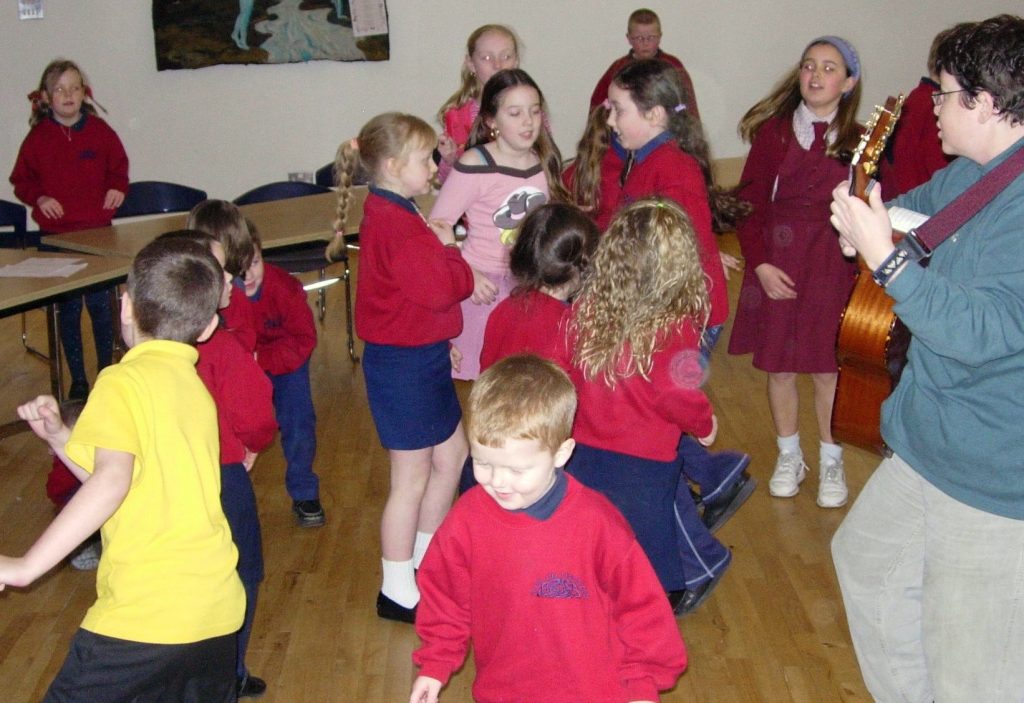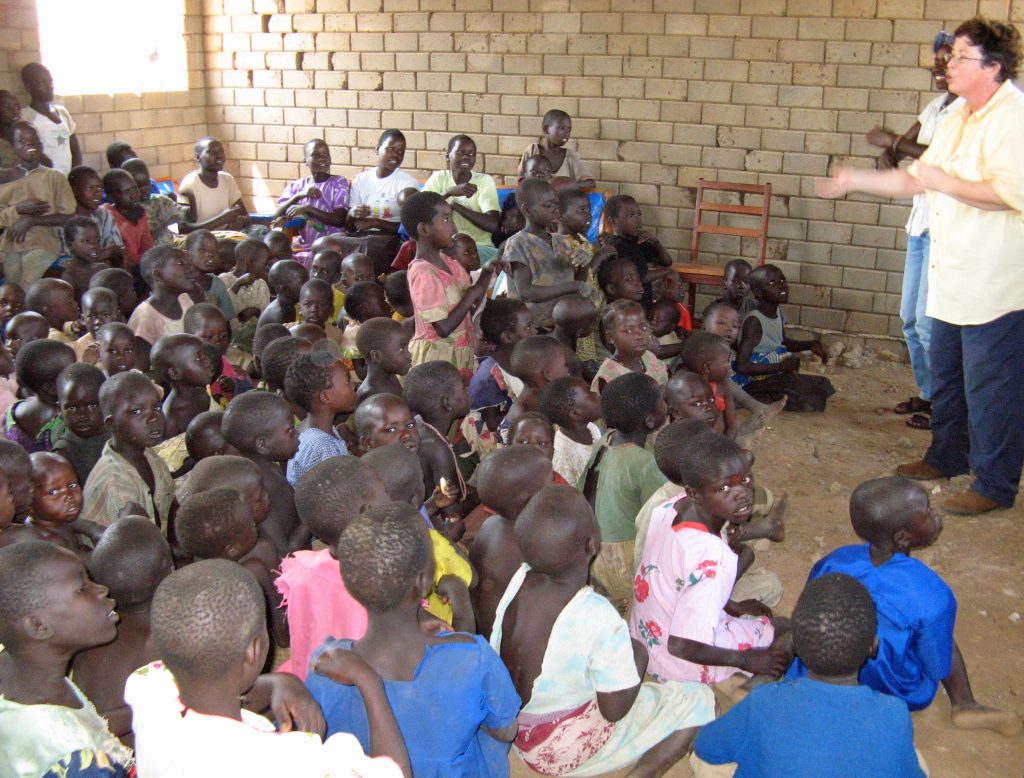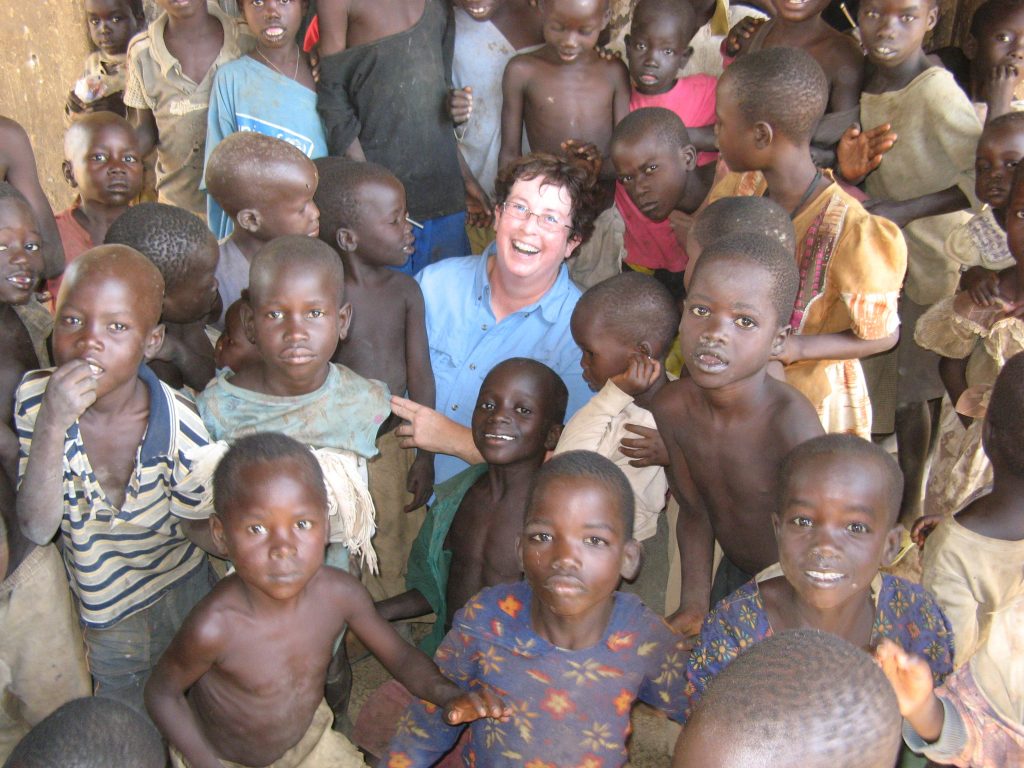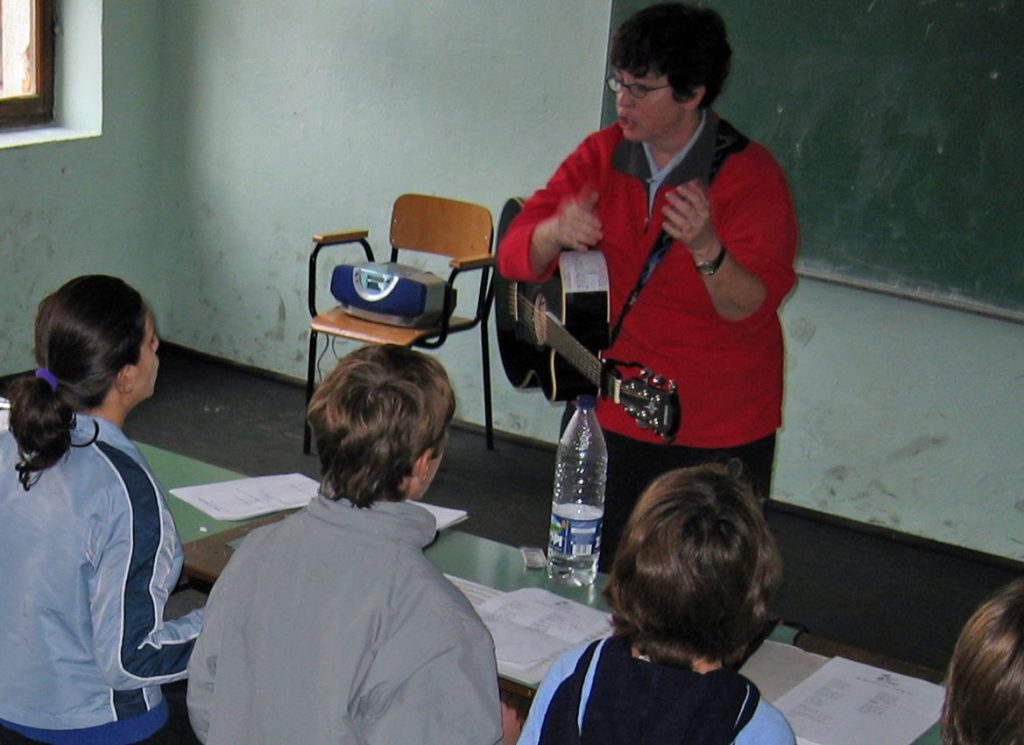Liz Shropshire is the founder and director of the Shropshire Music Foundation, which provides free musical instruments and instruction to former child soldiers and refugees in Kosovo, Uganda, and Northern Ireland. Since 1999, more than 10,000 young people have participated in Shropshire Music Foundation classes.
What led you to teach music to children victimized by war?
I did my undergrad at BYU in music composition and theory. Then I went to the University of Southern California and studied film scoring. I was going to be a famous film composer and change the world. I worked in that industry for a while but I kept having to ask my parents for rent money. After a few years of that it got kind of old and I decided I needed to have a monthly check coming in. So I decided to teach emotionally disturbed kids, partly because I didn’t need a teaching certificate but also because I didn’t just want to do something for money. I wanted to do good.
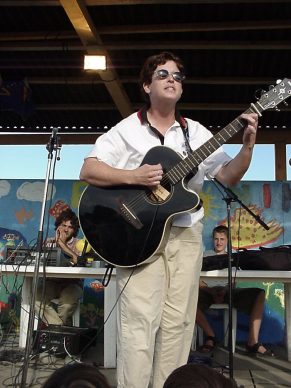
Liz leading 400 kids singing tolerance songs together at end of summer tolerance camp, Kosovo 2001.
Almost all of these kids were in gangs. Some of the girls had been prostitutes for a long time. There was a lot of drug use. The kids were in and out of jail. Up until then, I had been really good at any job I’d done, but this one, I was just in over my head. I didn’t have the street smarts. I wasn’t very good at it the first year. But I got all this great training.
My second year I got hired at a better school where the kids weren’t allowed to threaten your life. One of the teachers at that school wanted me to teach her kids piano. I said, “I’m not a piano teacher. I’m a composer.”
She said, “You’re a really good teacher and a musician. You can obviously teach.” After a while, I was making much more money with my private students than from my teaching.
I’d always wanted to do something to help out. I’d wanted to go to India and meet Mother Theresa. I wanted to start an orphanage in Nepal. But I’d never had the money for it. I was just scraping by. I kept thinking, Someday I’ll meet someone and they’ll say, “Oh you’re so talented. You have so much to offer. I will pay your way to go this country and do this thing if you will just work for free.” But of course that doesn’t happen in real life.
I had also always wanted to travel, so that’s what I did. I would get enough money to travel, then I would come back to LA and work some more. It felt very selfish, really self-centered.
In 1996 I went to Northern Ireland and that was the first time I saw the effects of war on children. I was walking across this Protestant neighborhood. Bombed-out homes had these horrible murals painted on them of men with masks and guns breaking down doors and sayings like, “We won’t surrender until we get what we want.” I saw this little boy, about eight years old, walking down the street all by himself. He was hunched over and he was smoking a cigarette. As he got closer I saw his face. He looked like an eighty-year-old. I felt so bad for this kid living in this neighborhood. As I walked through the town and looked closer at the kids, I saw this look in their faces, this haunted, hardened look.
I was in Belfast for General Conference. I found the chapel and went in and sat down and I looked at the kids around me and they didn’t look at all like the kids I’d seen on the street. I didn’t see that hardness. I didn’t see that closed-in thing. Yet they’d been living in the exact same situation as the street kids. I started crying. I don’t remember a word that was said that whole conference. I just cried the whole time and wrote and wrote and wrote that it just didn’t have to be like that.
That’s when I decided that I wanted to do something to help children affected by war. But I didn’t know what it was. I am a composer, so I thought I would write a piece of music that would change the world. I was going to use music from all these countries and children from these countries as part of the orchestra. I collected a bunch of music from Northern Ireland and I started looking at other countries.
Then in 1999, I was driving to the home of one of my piano students and listening to NPR. They were interviewing women from Kosovo who were living in refugee camps in Albania. They were telling a story I heard a million times once I was in Kosovo. The Serbs would go into the village, separate the men from the women, and then the women and the children would be told to leave, to walk to another country. While they were going they would hear gunshots but they weren’t even allowed to turn around and see what was happening to the men. They’d arrived in Albania and were living in refugee camps. The conditions were horrible. But the worst thing was that they didn’t know what had happened to the men in their lives, their fathers, sons, brothers.
At the time I actually had a plane ticket to go to Europe. I found a German-based group working in Kosovo, the Balkan Sunflowers. You paid your way to get to the country and then you gave them a couple hundred dollars to cover your living expenses after you arrived. You ate with them and slept with them and they took care of you. I thought I’d go play with kids and carry water for the women. But when I was talking to my next door neighbor, she said, “Liz, don’t just go to go. Do what you do best and take a music program to the kids.” Our LDS mid-singles group did fund-raising yard sales and I started contacting instrument manufacturers. I ended up going with about $5000 worth of instruments.
I wanted to get instruments that were small enough that the kids could put them in their pocket and nobody could take it away from them. I also wanted to have something that they could play neat stuff on. My brother had given me an Irish pennywhistle a few years before and I started playing it a lot and really liked it. So I decided to get Irish pennywhistles and harmonicas. If you get a good harmonica it will really last and the same with pennywhistles.
I was assigned to Gjakove, the hardest hit place in Kosovo. The people were back in Kosovo from Albania and most of them were living in IDP (internally displaced persons) camps. The camp I started working in was a brick factory that had about 350 people living in it, only three of them men. The rest were women and children. They were all wondering what had happened to their men and didn’t know if they were going to see them alive or not.
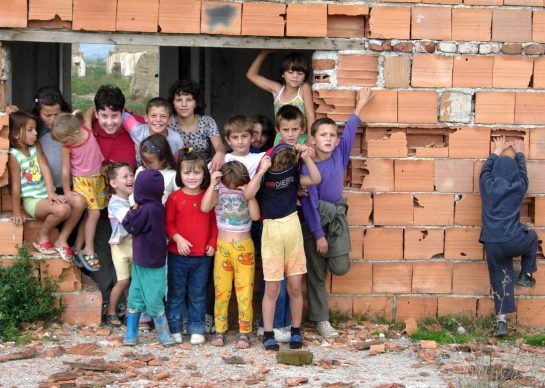
Liz with Kosovar homeless children living in shelter camp, 2004.
I took a volleyball the first day I went to the camp. The kids were outside running wild. They were making weapons out of everything. They had real guns and real weapons, too. I started playing ballgames with them and they would start fighting and I would say, “Stop fighting or I’m going to take the ball and go home.” But of course I’m speaking English and they spoke Albanian, so I don’t know what they really thought I was saying.
After about an hour I gathered up the ball and I started to leave. One of the women came out and grabbed me. She took me back to her room and all the women in camp had gathered in this room. There was a seventeen-year-old girl who was already a widow. She spoke some English so I talked to them through her. They couldn’t believe I was out there playing with their kids. They started telling me about themselves, and these women, they adopted me. They became my family over there. I used to sleep at the camp one night a week and it was always a party. I felt so loved by those women.
I ended up staying for six weeks and by the end I was teaching five music classes a day six days a week in the local school and four classes a day six days a week in the camp. This camp that had been so, so, so sad became a place with life in it. The walk to the camp was about forty-five minutes and the last fifteen minutes of the walk all you could hear were these instruments I had brought. It wasn’t pretty–the harmonicas were in the key of C and the pennywhistles were in the key of D–but the change was amazing in that camp. It became a place full of life. I saw it happen with the women, too. Even though the classes were for the kids, the women were laughing more.
At the end of six weeks, I’d used up all my savings. I’d maxed out my credit cards before I left. I’d spent everything to get over to Kosovo and do this program. The schools back in LA were saying, “We love what you’re doing but we’re going to fire you if you can’t get back. School has started.”
So I said to the kids, “I’ve got to leave.” And they started crying. I’d never seen the kids cry. I’d seen them re-enact executioner. I’d seen young children attack grown women. I’d seen all kinds of stuff, but I’d never seen them cry. So I said, “I don’t know how I’m going to do it, but I promise you I will come back.”
How did you start your non-profit foundation and how is it structured?
Back in Los Angeles I gave a fireside and at the end of it I said, “I’ve got to get back to these kids. I don’t know how I’m going to do it.” One of the women came up afterwards and said, “If you want to start a non-profit, I’ll be your accountant.” Another woman offered to be the lawyer. They did the paperwork and started the Shropshire Music Foundation.
Our whole foundation is volunteer-based. When I first started, my only role model was these other NGOs (non-governmental organizations) that do phenomenal multi-million-dollar programs hiring tons of locals. So that’s what I thought we needed to be, but I never, ever had the money for anything like that. We don’t even have an office. When I’m not overseas, my mom lets me take over her dining room table. We have a room we use in Kosovo. In Uganda, we use whatever room we’re staying in. A local family in Northern Ireland lets me live with them. So those are our offices. We have two full-time employees. One of them is me and one of them is our Kosovo program director who also directs the program in Uganda.
In Kosovo, this whole program is run by teenage volunteers. That first summer I didn’t speak the language and I was teaching 100 kids in a class. A twelve-year-old girl volunteered to translate all my classes. The next summer she came to me and said, “Can I translate for you again?”
I said, “Instead of translating, why don’t I teach you how to teach and then we can reach more kids.” Her friends started saying, “We want to do this, too,” and then their friends.
Now these kids run every aspect of the program: they teach the classes, write lesson plans, attend training once a week, and meet weekly to talk about what’s going on in their classes and to give each other advice. They decide the songs we’re going to sing, the new villages we go to. They volunteer 20 hours a week during the school year and 30 hours a week in the summer, all without pay. There are kids that have lost everything, kids that have reason to hate and be angry. Some of them lived in camps as recently as six months ago. They could have just felt sorry for themselves. Instead they have chosen to be agents of change in their community. When I ask them what we’re doing, they say, “We’re teaching children peace through music.”
Shropshire Music Foundation is a non-religious organization. You purposely exclude religious songs from your repertoire. Why did you set up the foundation this way?
Every place I’ve been where there has been war, religion has been used as a weapon. The war in Kosovo was perceived as being Christians killing Albanians. The Serbs–the Christians–would literally kill a baby and carve the name of Jesus in the baby’s body and then say to the parents, “You dirty Muslims don’t deserve to have a baby.”
I felt it was really important for people to see that I could live in their society and be a good Christian without forcing it on them. But everyone knows I’m a Christian. I’ve had kids come up to me in Kosovo, especially right after the war, and whisper in my ear, “Are you a Christian?” I’d say I am and they’d whisper back, “I thought so. I am too.” But they were whispering. It was very, very quiet because the Serbs had done so many atrocities in our community in the name of Christianity. There just weren’t fuzzy feelings toward Christianity.
I want to make sure kids know that no matter what they believe they’re welcome to be part of our program. Our program is a safe place.
Where do you live?
When I first started the program I would be in Kosovo for seven months every year and then I would come back to America and do fund-raising. Once the Kosovo kids could run the program and we started going to other countries, it changed. In an ideal year, I would be three months in each country, and three months in America. We had one ideal year and then the economy crashed. The last two years I’ve had to be in America a lot more than usual.
What are the biggest challenges your organization faces? What personal sacrifices have you made for the foundation? What are your long-term goals?
The biggest weak link in our foundation is fund-raising. And the main reason for that is that I’m our main fund-raiser. I’m a really good program director. I’m a good teacher. But I’m not a good fund-raiser. About 600 people support us every year. As the economy has gotten bad, people are still donating to us even if they have to donate less. The number of people donating to us has not gone down. That really means a lot to me.
I have no savings account; I used that all my first trip. I don’t get paid most of the time. Right now our foundation’s board insists I get paid $500 a month. When I have to buy clothes for speaking, I have to use my credit card, and I can’t always pay it off. So I would say that the biggest personal sacrifice is that I have to live with some personal debt—and I hate debt. I don’t care that I don’t have a car or a house or anything like that. But I don’t like having personal debt.
My long-term goal personally is that I get paid. I’m not in debt that much; all I have to do is get paid one year and I’m out of debt. My goal used to be that I would get paid and also that we would have a retirement fund. I don’t see that ever happening. But if I at least can start getting paid then I can start making my own retirement fund. But for the foundation, my goal is that we just keep doing this for the rest of my life and that by the time I die we have a bunch of other people doing it and it keeps going.
You came to Kosovo without knowing anyone or even knowing the language. How did you become an accepted part of the community?
When I first got there, the level of trust that people had for me because I was an American was exceptional. People I didn’t know would come up and hug me and say, “Go back to America and tell everyone thank you” because we had saved them. Now they’re not nearly as open but because I got there right after the war ended, they were very, very open to outsiders.
The women who adopted me in the camp certainly made a difference. And I was also accepted in the community because of the way I dressed. It was 110 degrees outside. Most of the aid workers were not dressed very modestly. I of course was. So I don’t know. I think they saw that I had no money, that I wasn’t living any better than they were.
You have been working in parts of the world where members of the Church are few and far between. How do you stay spiritually fed and watered?
I definitely wouldn’t be doing what I’m doing now without my mission to Nova Scotia. The single best decision I ever made was to go on my mission. It changed my life. I learned how to receive personal revelation. I became confident in my knowledge of the gospel and able to talk to other people about it in a way that they felt safe. I became more of a leader, more organized.
Because our mission was the lowest baptizing in the world, the mission president said we should use any opportunities to get into the community. My music opened up doors that nothing else did. I directed a community musical. I filled in for the local choir director when he couldn’t make it because of snowstorms. We started a children’s choir in a community that had never had one. I taught a two-month composition class in the local high school. My mission helped me realize that I could set a goal and if I felt Heavenly Father wanted me to do it, it didn’t matter what anyone else said or how “out there” it seemed. I could do it.
I wouldn’t be able to do this without the scriptures. There’s no way. I love the scriptures. Reading the Book of Mormon after doing this has been such a different experience. I remember back in LA someone in Sunday School said, “Why is the Book of Mormon so full of war?”
I said, “Because most of the world is mostly about war. We get to live in this pretty safe country and we don’t see it across the street, but the world does.” Mormon never got to be anything but a soldier. He tries to leave it, but he can’t stay away. He knows he’s going to get killed by these guys, yet he’s compiling scriptures for their children. When I get upset, when I get hurt, I think of Mormon’s amazing example of loving in spite of what happens to us.
How has your being single affected what you do?
Being single was not my goal, but a scripture I read soon after I started the foundation really hit me: “I consecrate unto them this land for a little season, until I, the Lord, shall provide for them otherwise… And the hour and the day is not given unto them, wherefore let them act upon this land as for years, and this shall turn unto them for their good” (D&C 51:16-17). I don’t know how long I will be in “this land” or this state of being single but I’m going to use my singleness to do as much as I possibly can. I can do stuff being single that I couldn’t do if I were in a different situation. Although it might not be what I would choose, it’s definitely what has proven to be an incredibly happy wonderful life for me. It’s because I’m single that I can do this. How can I not rejoice in that?
At A Glance
Liz Shropshire
 Location: Arizona, Kosovo, Belfast, Uganda
Location: Arizona, Kosovo, Belfast, Uganda
Age: 49 going on 36
Marital status: Single
Children: About 10,500 so far, age 2 to 26
Occupation: Founder, President, and International Program Director of Shropshire Music Foundation
Schools Attended: BYU, USC
Languages Spoken at Home: English and Albanian
Favorite Hymn: “Our Savior’s Love”
On The Web: www.TeachingChildrenPeace.org
Interview by Annette Pimentel. Photos used with permission.
At A Glance

